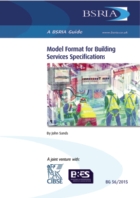Preparing building-services specifications

In this age of BIM and information management, it is possible to forget that the key part of the information used during construction projects is the specification. It is the mechanism for designers to impart their detailed technical requirements for engineering services and systems.
A new guide (BG6/2014 from BSRIA), a joint venture with CIBSE and B&ES, provides a model format for building-services specifications. It will aid efficiency and understanding for all parties involved in preparing and using specifications.
Specifications that are inaccurate can lead to confusion, errors in pricing and can exacerbate difficulties in the commercial and contractual process. It is vital that specifications are written in such a way as to be readily understandable by the user. They should clearly describe what systems are to be provided and how they are intended to be operated once installed.
The guide provides the general framework covering the arrangement of sections and clauses within which an author can use their content with the least amount of change.
Chapters cover the 'traditional' specification practices, key points on preparing more-effective specifications, model specification formats and an example. Classification has also been included, along with the standard numbering to aid comparison with some existing specification preparation tools.
A full list of Common Arrangement of Work Sections (CAWS) work sections has been included in the appendix. This will be helpful when aligning the specification to BIM activities, particularly as the final pieces of the Government’s Level 2 BIM strategy fall into place.







